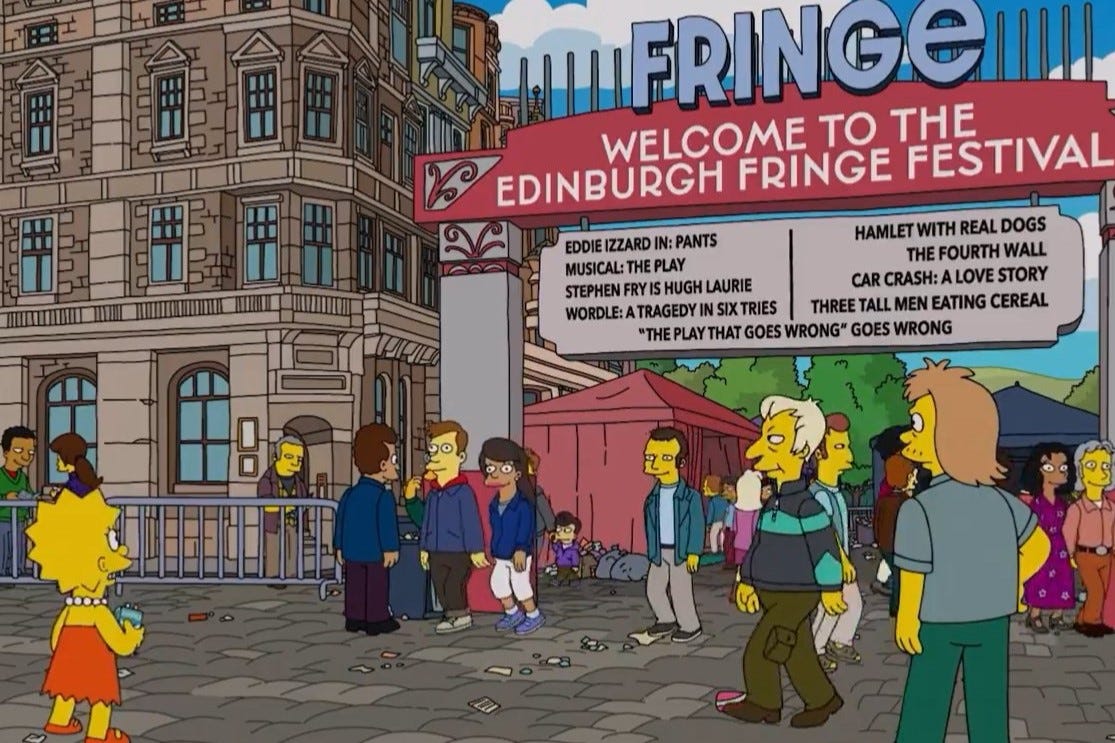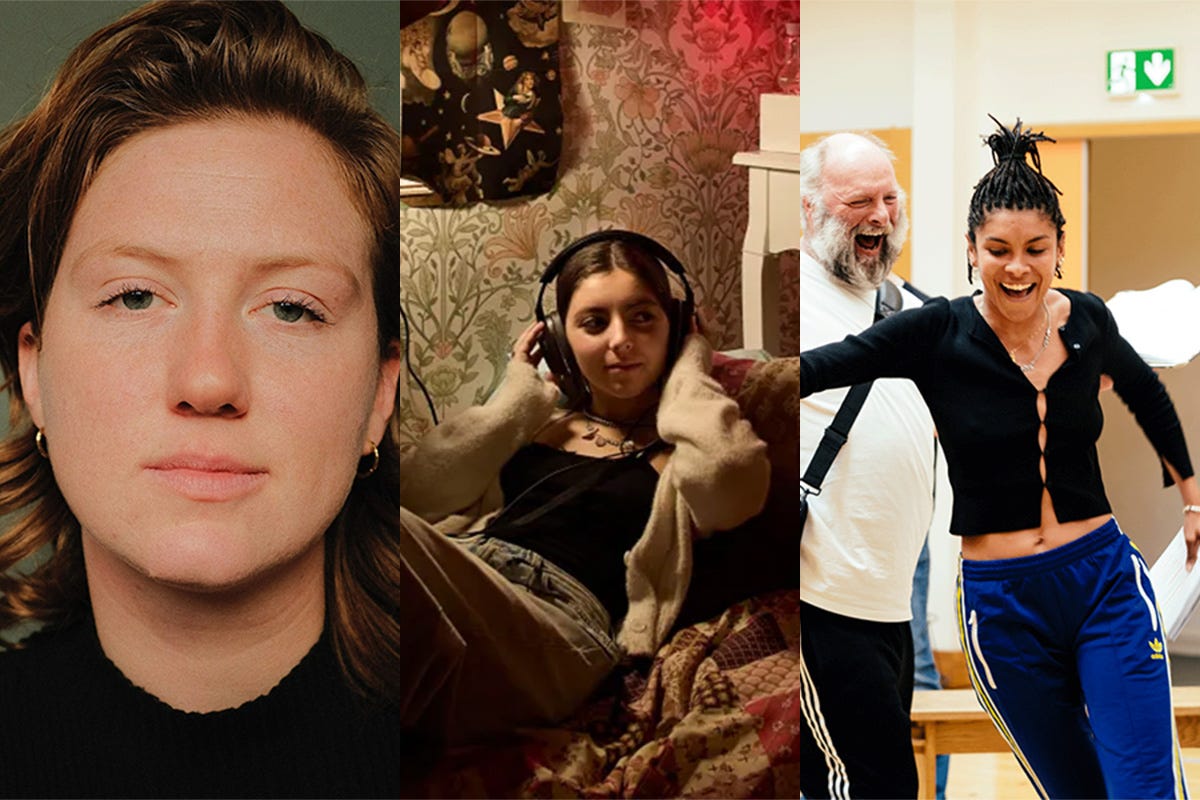The Edinburgh Fringe is brilliant but broken. This is how to fix it.
The programme for the world's largest arts festival launches next week. We need to radically rethink how it works. Plus: three shows to see. Also: no more newsletter until mid-July.
Hello, and welcome to The Crush Bar, a newsletter about theatre written by Fergus Morgan.
This is the free, Friday issue, which usually contains a Q&A with an exciting theatremaker or an essay on a theatre-related topic. This week, there is a bit from me on the Edinburgh Festival Fringe, the myriad problems it faces, and how I think they could be addressed. After that, there are your usual three show recommendations: one in Scotland and two in London.
In case you missed it, here is Tuesday’s issue of Shouts and Murmurs, which is a weekly round-up of the most interesting news, reviews, interviews and articles about theatre elsewhere…
You can get Shouts And Murmurs straight in your inbox every week by signing up as a paid supporter of The Crush Bar for £5/month or £50/year. If you don’t feel like paying but still want to get the newsletter, then just reply to this email saying so, and I will make that happen.
One last thing: this will be the last issue of The Crush Bar for a few weeks. I am off on holiday (again, yes, sorry) on Monday for a fortnight, then taking some time off to focus on other stuff for a while before this newsletter’s coverage of the Edinburgh Fringe kicks off in mid-July. Regular scheduled newsletters, including Shouts and Murmurs, will resume in mid-September.
Next week, the full programme of the 2024 Edinburgh Festival Fringe will be launched.
It will either fall just short of the record 3841 shows that were staged in 2019, or it will surpass that number to become the biggest event in the festival’s 77-year history. Seven or so weeks after that, it will kick off. Hundreds of thousands of people will descend on the Scottish capital throughout August, and millions of tickets will be sold to over 50,000 separate performances in several hundred different venues. Yikes.
The Edinburgh Fringe is undeniably a wonderful thing. Over seven decades it has fostered countless comedians and theatremakers, many of whom have gone on to have a lasting impact British and global culture, from Alan Bennett to Tom Stoppard, to Rowan Atkinson, to Eddie Izzard, to Phoebe Waller-Bridge, to Richard Gadd. It has been a crucible for innumerable insane ideas and a melting pot for millions of minds. It has, simply, changed a lot of lives in a lot of ways, including mine: not only do I owe my career as an arts journalist to the existence of the festival, but I met my wonderful partner at Summerhall in 2018, and now write this in the Edinburgh flat we share.
Essential to this extraordinary success and to its identity as a festival since it began in 1947 has been the fact that it is “open access.” Anyone, whoever they are and wherever they are from, can come to the Edinburgh Fringe an unknown and emerge as a star. The net is, in theory, cast infinitely wide, and so the catch is consequently remarkable.
In its current state, though, the Edinburgh Fringe is a terrible thing, too. Its sheer size, a product of its extraordinary success, has acted as a catalyst for a cascade of interrelated problems. It has pushed the price of accommodation in August in Edinburgh – a fairly small city to be hosting the world’s biggest arts festival – through the roof. That has, in turn, made attending the festival, either as artist or audience, incredibly expensive, and that has had a knock-on effect on everything from accessibility to stress: a lot of people cannot afford to come to the festival, and those that do have spent so much money to be here that they are under severe pressure to succeed. The festival’s raison d'être as a fun free-for-all is seriously threatened.
And, yes, although the huge influx of people to the Scottish capital every summer has undoubtedly been good for some sectors – and become a cornerstone of Edinburgh’s economy as a result – it has also resulted in swathes of property being converted into AirBnBs, which has hollowed out communities and contributed to a severe housing crisis. Last year, Edinburgh recorded record homelessness figures, prompting the city council to declare a housing emergency. Quite rightly, despite opposition from Edinburgh’s overloud landlord lobby, it has pressed ahead with legislation introducing restrictions on short-term let accommodation. This has further inflated the cost of accommodation for visitors, yes, but the city’s residents must always come first.
The festival’s problems could be alleviated if there was a concerted effort to do so. Sadly, the festival’s governance is totally dysfunctional at the moment, with the underfunded umbrella organisation, the venue operators, the city council, the Scottish government and myriad other stakeholders – including the mysterious Fringe Alliance – all pulling in different directions. Dialogue between them is perpetually strained.
“How do you control an inherently anarchic event without putting up barriers? How do you tame a tornado?”
What to do? Well, everything that has been tried so far has addressed the symptoms rather than the root cause of the Edinburgh Fringe’s problems. People feel stressed so mental health support has been offered. People cannot find anywhere to stay, so more accommodation has been found. People cannot afford to come in the first place, so awards and bursaries and prizes have been instituted. These are all great, of course, but they are sticking plaster solutions. We need to think about open-heart surgery.
The fundamental dilemma is this: how do you make the Edinburgh Fringe more affordable, more accessible, and less stressful without harming the livelihoods that rely on it too much and without compromising its identity as an open access event?
How do you control an inherently anarchic event without putting up barriers? How do you tame a tornado? How do you shepherd a superstorm? It is a daunting proposition.
There are things that can be done, though. The city council’s short-term let restrictions should be streamlined to allow residents to let out spare rooms and primary residences, but they should also go further and introduce a cap on accommodation costs. More effort should be put into providing better transport links to other towns and cities in Scotland in August so they can share the burden of visitors, too. More effort should be put into providing cheap accommodation like campsites and festival villages, and it is heartening to see that the Fringe Society has acted on that suggestion this year. And, as I have argued before, new metrics to measure the festival’s success need to be found: trumpeting about the sheer volume of tickets sold tells us nothing about the experience of individual artists.
Above all, though, I think that the festival needs to contemplate managed shrinkage, and I have a suggestion for how to do that while still welcoming anyone and everyone with open arms and thus without sacrificing its essential open access identity. It is this: limit the number of performances any show in the official programme can do.
There are, of course, several drawbacks and downsides. Shorter runs means fewer chances to have your show seen by important people. Venues might struggle to find a sustainable business model at first. And I am under no illusions that it would be easy to implement. Every stakeholder is currently operating in strained circumstances. Currently, they do not even have the time or resources to contemplate reimagining the festival, let alone pursue that reimagination. In any case, trying to impose any measure on the Edinburgh Fringe is tricky. If someone does not like it, they will simply strike out on their own. It is like trying to hold water in your hands. To even begin such a process would require more funding and much more coordination.
Think of the benefits, though. Say a show was limited to 10 performances. That would slice the demand for artist accommodation in the city by over half, thus freeing up hundreds of options and lowering the cost of them for everyone, which would in turn make the festival far more accessible. It would mean that artists would not have to suffer the stresses and strains of three-and-a-bit gruelling weeks of performances: they could pour all their imagination and energy into ten great shows. And I am not even sure that fewer performances would damage a show’s professional ambitions: at the Edinburgh Fringe, a short run often lends a show a must-see-now cache, whereas when shows run for the entire event, you delay and delay and delay catching them until it is all over. If such a measure were introduced gradually, too, it would give the venue chains and the economy that has grown up around the festival time to adjust.
Obviously, this is just a wacky idea, but I think the time for wacky ideas has come. I am looking forward to the Edinburgh Fringe. I am looking forward to thousands of shows and thousands of people descending on my city for the world’s largest arts festival. Above all that, though, I am looking forward to a time when we can have a serious discussion about the festival’s future and how to mitigate its awfulness while preserving its brilliance. Perhaps this suggestion could kickstart that conversation.
Three shows to see next week
Medea On The Mic - A Play, A Pie and A Pint, until June 15
The penultimate show of A Play, A Pie and A Pint’s mammoth spring season opens at Glasgow’s Oran Mor on Monday, and it looks set to be one of the best. Written by Nazli Tabatabai-Khatambakhsh and directed by Philip Howard, it is a feminist, queer, retelling of the ancient Greek tragedy featuring a cracking cast of Hannah Jarrett-Scott, Reuben Joseph and Marc Mackinnon. You can get tickets via the button below.
Viola’s Room - One Cartridge Place, until August 18
The new experience from immersive pioneers Punchdrunk is less spectacular than previous productions The Drowned Man and The Burnt City, but it sounds equally entrancing. Six audience members at a time are asked to don headphones and take off their shoes, before being led through a labyrinth of ethereal spaces while listening to Helena Bonham Carter narrate Booker Prize nominee Daisy Johnson’s adaptation of Barry Pain’s 1901 short story The Moon Slave. Created by Felix Barrett, Casey Jay Andrews, Simon Wilkinson, Gareth Fry and Hector Harkness, it runs at Punchdrunk’s Woolwich home until mid-August. You can get tickets via the button below.
The Taming Of The Shrew - Shakespeare’s Globe, until October 26
Jude Christian is one of the most exciting directors working in Britain today. Two years ago, she radically reimagined Titus Andronicus in the candle-lit Sam Wanamaker Playhouse. Now, thrillingly, she is taking on The Taming Of The Shrew and all its anachronistic awkwardness and misogynistic messiness in The Globe’s main space. You can read my interview with the extraordinary Thalissa Teixeira, who is playing Katherina, in The Stage here, and you can get tickets via the button below.
That’s all for this issue and for the next month.
That is it for The Crush Bar until mid-July. If you want to get in touch about anything raised in this issue - or anything at all, really - just reply to this newsletter or email me at fergusmorgan@hotmail.co.uk. Or you can find me on Twitter/X, where I’m @fergusmorgan.
A quick reminder of the ways you can support The Crush Bar. You can share it. You can use it for promotional purposes. And you can become a paid supporter. There are currently 2947 subscribers, 101 of whom are paid supporters. If you want to join them, you can do so above.
See you soon
Fergus





